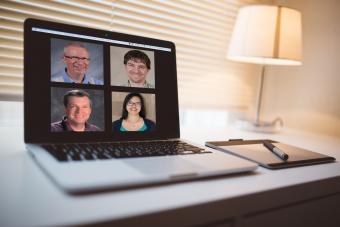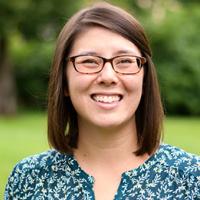Local high school teachers go through Mines' Computer Science Field Session for one-of-a-kind learning opportunity
“It was quite literally the best professional development I’ve ever had as a teacher,” said Jocelyn Nguyen-Reed of Cherry Creek Innovation Campus.

Denver area high school teachers, clockwise from top left, Clark Scholten, Tim Gesell, Jocelyn Nguyen-Reed and Kyle Gillette, went through the all-virtual Computer Science Field Session this summer. (Photo illustration by Joe DelNero/Colorado School of Mines)
At the core of every academic program at Colorado School of Mines is the field session, an immersive, hands-on summer learning experience for undergraduate students that’s a requirement for graduation.
In Civil Engineering, students learn how to survey under the rise of Mount Zion. In Geological Engineering, students spend six weeks doing geological mapping in the mountains and canyons of Utah and southwestern Colorado.
In Computer Science – the fastest-growing department on campus – Summer Field Session focuses on advanced software engineering, with teams of 3-5 students spending five weeks to create working software products for real-world clients.
This summer, one of the teams looked a little bit different than usual, though.
Four Denver area high school teachers joined Mines students to complete CS Field Session – teaming up for a one-of-kind professional development opportunity that CS@Mines hopes to offer again for other local teachers through its C-START initiative.
“Colorado K-12 students deserve outstanding computer science education, which is only possible if our teachers have valuable professional development opportunities available to them,” said Tracy Camp, professor and head of the Computer Science Department at Mines. “CS@Mines is thrilled to offer a variety of professional development opportunities for Colorado K-12 teachers through C-START.”
The pilot program’s four teachers came from public and charter schools around the Denver metro area, some with past professional experience in the tech industry and others career educators.
Their assignment: build an online database and web application for Be More Adaptive, a Texas-based nonprofit organization dedicated to connecting people with disabilities to adaptive resources such as wheelchairs, text-to-talk devices, sports prostheses and more.
“Their goal was to create a database, preferably one that could obtain information automatically from the internet about organizations, and a front-end web application where people can go and search for adaptive technologies by disability category, by geographic region, by adaptive technology, narrowing the results into the area that they’re in with the resources that they need,” said Christopher Painter-Wakefield, teaching professor of computer science and the teachers’ field session advisor.
The teachers met weekly with Be More Adaptive CEO Caitlin Conner to demonstrate the new features they had completed and get immediate client feedback. On a daily basis, the team met over Zoom to check in on progress and talk through coding problems and other issues.
“It was quite literally the best professional development I’ve ever had as a teacher,” said Jocelyn Nguyen-Reed, who teaches computer science and cybersecurity at Cherry Creek Innovation Campus (CCIC), a stand-alone college and career preparedness facility for high school students in the Cherry Creek School District in Arapahoe County.
Nguyen-Reed came to computer science by chance, getting assigned to teach computer science in her first year as a teacher at Cherry Creek High School. Eight years later, she jumped to CCIC to help launch the district’s new programs in cybersecurity and data science.
“An industry experience was a missing link in my skill set,” Nguyen-Reed said. “Outside of teaching, I never had an opportunity to work on a larger project with a larger team and see it through a full development cycle. When working with students on larger-scale projects, I didn't feel I had the ability to give valuable insight.”
Not anymore, though.
“I developed skills I never would have, had I not had this experience. I sharpened my skills in Python. I have a much better understanding of how websites are built, hosted and deployed. I have more experience with databases. All of that was extremely valuable and helped deepen the skills I had acquired over the years,” she said. “Helping to bring someone else’s vision into reality was very special – it’s very different than a typical class experience.”
That real-world agile development experience is something Clark Scholten, a computer science teacher at Pinnacle Charter School in Thornton, hopes to incorporate into his own high school classroom moving forward.
“Agile development is this idea that you are doing things quickly but at each step of the process you end up with a feature that’s runnable,” Scholten said. “We had a customer that was looking for a particular function and we needed to be able to demonstrate that to her by Thursday afternoon. That real-world deadline, to go through that ourselves was so valuable.”
Relatively new to teaching, Scholten spent 26 years working for IBM developing systems-level code and designing servers before enrolling in the company’s Transition to Teaching program. Even so, his professional experience is already dated, he said.
“The field changes so rapidly – the technologies we built this website with weren’t around when I worked at IBM,” Scholten said. “Even though I've only been out of the field for six years, all this tech was either brand-new at the time or hadn’t even been created yet.”
Among the technologies the team employed on the front-end application were Vue.js and BootstrapVue, both using JavaScript. On the back end, they worked with Django and PostgreSQL, using the Python language. “We got to dig into these new technologies, we got to develop our own web APIs, we got to dig into security and learn how to present a website where users can log in to access the administrative side,” he said.
“I also took away a real appreciation for what my students go through – as I was learning new technology, I had struggles. There were things I tried to learn and I tried to put together but when I put it into the website, it wouldn’t work. And it was really frustrating,” Scholten said. “I was able to learn something new that really challenged me as a computer programmer.”
Rounding out the team were Tim Gesell, a computer science teacher at Fairview High School in Boulder, and Kyle Gillette, a recently retired computer science teacher from Lakewood High School.
Aside from starting a couple of weeks after the rest of CS Field Session due to Colorado’s K-12 academic calendar – and skipping a few oral communication components targeted more at future computer engineers than working educators – the teachers really did get the full CS Field Session experience, Painter-Wakefield said.
“Field session is very different from any other professional development they do as teachers,” Painter-Wakefield said. “It’s all about filling in the blanks – you’ve got a set of skills but how do they all go together and how do they actually produce something? This really filled in the blanks for the teachers, as it does for our students.”
Working as the team’s advisor was an equally rewarding experience for him, he said. “After seeing how well it went, if there’s interest from teachers, we would definitely offer this again. I did not know what to expect, but it was a very exciting and satisfying experience.”
The relationships built through the experience will last long beyond the program’s five weeks, too, Cherry Creek’s Nguyen-Reed said.
“Most computer science teachers are singletons in their buildings. To have a team that you see every day that you know understands your daily struggles as a teacher is really helpful,” she said. “There’s a camaraderie that comes with it that we don’t always get in our normal day to day.”
“I really, really enjoyed getting to connect with my fellow teachers,” she said. “Beyond what we were learning and the problems we were facing during our project, we also were able to share teaching practices, educational philosophies and more. I’m walking away with friendships that I suspect I’ll have for quite some time and these are people I can reach out to if I ever need support.”




